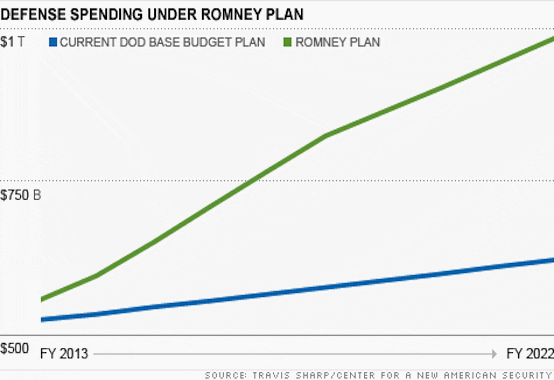Mitt’s Bad Math

In 2008, I thought John McCain deserved to lose. This did not mean I believed Barack Obama deserved to win. What McCain represented was four more years of George W. Bush—a drastic expansion of government spending and size in both our domestic and foreign policies that was largely without precedent in our history. Voters rightly saw McCain as an extension of Bush and rejected that Republican brand accordingly.
In 2012, I believe Obama deserves to lose. Everything I detested about Bush, Obama has expanded—the debt, entitlement state, “national security” state, and an even more powerful executive branch. Despite Obama having an edge in the polls, his actual job performance approval is not high. Many, and perhaps a majority, of Americans would like to reject him.
They are just not so sure Mitt Romney deserves to win.
I share this concern. In their first debate, Romney kicked Obama’s ass. When not only the conservative media are cheering Romney’s performance, but also liberals like MSNBC’s Chris Matthews are angrily frothing at the mouth over Obama’s lackluster showing, the winner becomes clear.
But what does “winning” actually mean? Obviously and inevitably, who gains in the polls thus giving that candidate a better shot at being president. But what aspect of this “winner’s” performance means he actually deserves this electoral edge?
Scoring a debate generally means deciding who sounded better, looked better, talked better—who spoke with more authority, commanded more respect, and conveyed “presidential.” In professional wrestling, the “winner” of a match is usually the one whom promoter or fans deem most charismatic, not necessarily who’s best at actually wrestling. In 2008, candidate Obama could give an interview worthy of Hulk Hogan, with millions of Obama-maniacs chanting his name. In 2012, many Americans see this president as a choreographed fraud whose personality no longer obscures his failure to deliver.
Something Romney promised with his winning personality Wednesday night—deficit reduction—is also something hard numbers indicate he cannot deliver. If Obama said anything true it was this: “When you add up all the loopholes and deductions that upper income individuals are currently taking advantage of, you don’t come close to paying for $5 trillion in tax cuts and $2 trillion in additional military spending.”
He added: “It’s math, arithmetic.”
Romney protested that he was not asking for $5 trillion in tax cuts (too bad) and in the Governor’s defense, Obama’s relentless griping about “loopholes” and “deductions” for “upper income individuals” could mean something—or it could be the same, tired, class warfare drivel the Democrats have been peddling for as long as I’ve been alive. On this, I trust Obama’s accuracy as much as Hulk Hogan’s sincerity.
But that “$2 trillion in additional military spending” is something Romney did not even attempt to protest. Whatever hope I had that Romney would represent a dramatic improvement over Obama was dashed—not during Wednesday’s debate—but last May, when CNN reported:
Mitt Romney is campaigning on a platform that emphasizes less spending, smaller deficits and renewed fiscal responsibility. But in one budget area, Romney is running the opposite direction. The former Massachusetts governor wants to increase defense spending by leaps and bounds. By one estimate, additional spending would exceed $2 trillion over the next decade… The additional spending really piles up in future years.
The need to cut military spending is something I have emphasized in columns for so long and so often that at least one of my editors has asked me to stop talking about it. Indeed, if there’s an issue I could be accused of being fanatical about, the dire need for cutting “defense” spending is certainly it.
But Romney’s platform proves my point. If our annual deficit is between $1-1.5 trillion, and neither candidate is really serious about cutting entitlement costs which are far, far greater—how can anyone even pretend they’ll reduce the deficit while increasing spending by $2 trillion on our military?
If our soldiers are not paid enough, do not receive proper benefits, or do not have necessary weapons or essentials it is not because we don’t spend enough on the military. We currently spend more on our military than we ever have—and most of that money goes to fund a massive bureaucracy that has little to do with our actual defense.
That America’s youth aren’t better educated isn’t because we don’t spend enough on education. Conservatives rightly understand this government dynamic when it comes to agencies like the Department of Education. They need to start understanding it when it comes to the Department of Defense. As Ramesh Ponnuru says bluntly:
What Republicans should not do is make an economic argument for defense spending that is both untrue and inconsistent with everything else they say about spending and the economy. When they do that, they treat the nation’s defense as little more than a source of political pork.
Romney won the presidential debate. But what do we “win” if he becomes president? The last time a smooth-talking, charismatic—debate-winning—candidate became president, he promised he would cut the deficit in half. At the time, anyone with a calculator knew Obama was lying.
Romney’s proposal to add $2 trillion in military spending makes it impossible to cut the deficit. Period. It’s math. It’s arithmetic. Barack Obama deserves to lose this election. But Mitt Romney does not deserve to win it.
Jack Hunter is the co-author of The Tea Party Goes to Washington by Sen. Rand Paul and serves as New Media Director for Senator Paul. The views presented in this essay are the author’s own and are independent of any campaign or other organization.
Comments